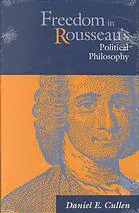
Freedom in Rousseau’s political philosophy PDF
Preview Freedom in Rousseau’s political philosophy
Freedom in Rousseau’s Political Philosophy ■4 4 'i 3 Freedom m Rousseau’s Political Philosophy Daniel E. Cullen NORTHERN ILLINOIS UNIVERSITY PRESS DeKalb 1993 © 1993 by Northern Illinois University Press Published by the Northern Illinois University Press, DeKalb, Illinois 60115 Manufactured in the United States using acid-free paper @ Design by Julia Fauci Library of Congress Cataloging-in-Publication Data Cullen, Daniel. Freedom in Rousseau’s political philosophy / Daniel Cullen. "5c 17? p. cm. Includes bibliographical references and index. c%so ISBN 0-87580-180-3 1. Rousseau, Jean-Jacques, 1712-1778—Contributions in im political science. 2. Liberty. I. Title. JC179.R9C85 1993 323.44—dc20 93-16549 CIP l5oro To my mother and to the memory of my father Contents Preface ix Acknowledgments xiii 1 The Problem of Freedom 3 2 The Natural Paradigm 31 3 The Achievement of Democratic Freedom 70 4 Citizenship, Community, and the Politics of Identity 117 Notes 169 Bibliography 223 Index 233 Preface The commentary on Rousseau is replete with efforts to draw from his work a single, self-consistent theory. He has variously been called an asocial individualist, a liberal, a conservative, a majoritarian populist, and a totalitarian. One is tempted to say that any coherent interpretation of Rousseau must be an astig matism that prevents certain rays of his theory from coming into focus. The unity of his work is indeed a complex one that, in the interpretation I offer here, consists in an effort to ground indi vidual freedom both in constitutional principles of right and in community—to unite the rational assent to principle character istic of liberalism with the affective community values associated with conservatism and, more recently, communitarianism. I attempt in this book to delineate and criticize Rousseau’s theory of political freedom. The heart of that theory is an expla nation of social equivalents for the conditions of the state of nature that supported natural freedom. Rousseau did not share the belief of Hobbes and Locke that self-interest could be en lightened. The social conflicts that self-interest engenders might, in his view, be resolved only by assimilating the individual self to a community self {moi commun). Still, in line with Hobbes and Locke, Rousseau conceived freedom negatively, not as self- development through political participation. Freedom for Rous seau meant individual independence of other wills, which in his view was the natural and best condition for humankind. All the prescriptions of his political theory were intended by Rousseau to show how that independence could be established in civil order. Thus moral freedom, possible only in society, was a way to independence, not a value in itself. The expression of the general will similarly had no value for Rousseau as the voice of a mystical “Oversoul.” The general will was for him a fence to
